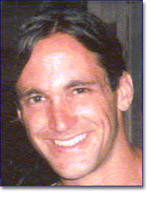David Carr, one of our most recently hired faculty members who will begin at UCSB July 2004, has received three professional accolades already this year. At the recent Association of American Geographers (AAG) conference, he was the co-winner of the Nystrom award.* The award is for the best paper based on a recent dissertation in Geography. Also at the AAG, he was selected as Chair of the Human Dimensions of Global Change Specialty Group. And in January, he received a post-doctoral research excellence award from the University of North Carolina, where he is currently working.
Paper on Forest Conversion to Agriculture
The paper, based on his dissertation, that won the Nystrom award was about deforestation from expanding agricultural. The site Carr studied was in Guatemala. Carr wrote, “The long history of forest conversion to agriculture represents the most expansive footprint of human habitation on the earth’s surface. The planet’s intact forests have dwindled to one-fifth of the their original cover. During recent decades deforestation has accelerated and is now almost totally concentrated in the most biodiverse forests on earth. If rates continue as during the last decade, most biologically rich forests on the planet will be erased within fifty years.
“This trend has several human and environmental consequences. The diminution of the planet’s gene pool threatens future advances in science, medicine, and food production. Forest elimination has also led to soil erosion and increased sedimentation of waterways, hydrological and nutrient cycle perturbation, and soil impoverishment. Tropical deforestation has global consequences as well, threatening to exacerbate climate change at local and global levels.
“Within Latin America, much attention has focused on the ecological devastation of the Amazon, yet no major world region has lost a greater percentage of its forest cover than Central America in recent decades. Only seven countries worldwide contain as much forest as Guatemala (over 28,000 km.2) and at the same time experienced a greater rate of deforestation during the 1990s (1.7% per annum). Most of the forest clearing in Guatemala in recent years has been concentrated in the Maya Biosphere Reserve, particularly in one of its core conservation zones, the Sierra de Lacandón National Park (SLNP).”
SLNP is the area which Carr studied for his dissertation. Differing from previous research, Carr focussed on why the farmers moved to the locations where they cleared the forest to grow crops. Any attempt to ameliorate the spectre of global degradation from deforestion will need to address the answers to this question!
Specialty Group Chair
It is an honor — and a responsibility — to be chosen Chair of the Human Dimensions of Global Change Specialty Group (HDGC).The Chair coordinates sessions sponsored by HDGC for AAG and for other professional meetings and disseminates information on conferences, funding, publications, and other scholarly activity in the human-environment community. (One way information is disseminated is through a bi-annual newsletter.) The duration is for two years. There are over 100 members.
Research Excellence Award from University of North Carolina (UNC)
Last fall, UNC’s Office of Postdoctoral Services established the Postdoctoral Awards for Research Excellence. Ten were given out for 2004, each carrying an $800 stipend. The award was designed to help postdoctoral scholars pay for their professional development needs, such as conference travel, written materials and skills workshops. According to the UNC’s newsletter, The Gazette, the Office of Postdoctoral Services was surprised at the number of applicants — there were 60 — since this was the first year such an award was offered. Carr was chosen for his work with the Carolina Population Center, which is located at UNC.
Congratulations, David! and we look forward to your joining us this summer!


